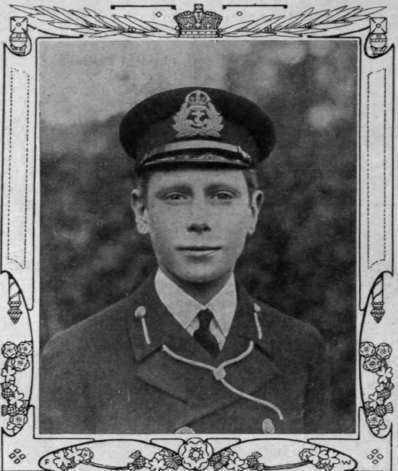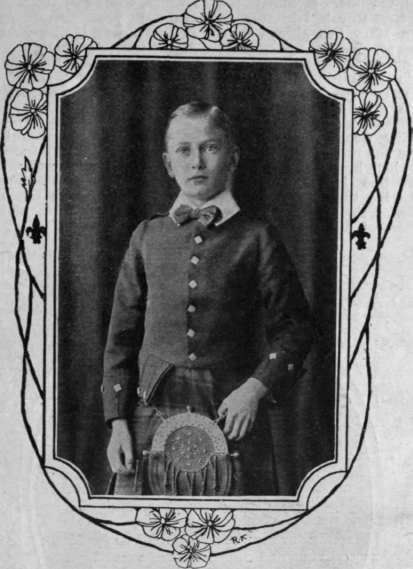Children. The Home Life Of King George's. Part 2
Description
This section is from "Every Woman's Encyclopaedia". Also available from Amazon: Every Woman's Encyclopaedia.
Children. The Home Life Of King George's. Part 2
And here we have another illustration of the thoroughly sensible manner in which their Majesties have brought up their children. While maintaining a strictness in the schoolroom and discouraging too many parties and indoor entertainments, the King and Queen have done everything they possibly could to instil into their children a love of

Prince Albert, second son of King George V. and Queen Mary, in his uniform as a naval cadet. Prince Albert is already in axcellent golfer, as well as a keen cricketer. He will probably enter the naval service
Photo, W. Kirk and Sons, Cowes outdoor games. Time after time the King has arranged football and cricket matches in order that his sons might participate in them, for he, as well as the Queen, recognise that a sound body is the best foundation for a healthy mind.
Princess Mary, the "Jubilee Baby," as she was called - for she was born in 1897 - is also very enthusiastic about games and sports. This, perhaps, is but natural, seeing that she is the only girl in a family of five boys. She is particularly fond of cricket, insisting not only on fielding for her brothers - most boys seem to think that this is all a girl is capable of doing -but also on sharing the bowling and batting. She has been taught riding and driving, and can easily manage a pair of ponies. She is also fond of swimming and bicycling. Her great ambition is to be allowed to drive a motor, and on one occasion she asked King Edward to allow her to drive one of his cars in Windsor Forest, doubtless feeling that such an indulgent grandfather would be likely to stretch a point in her favour. "Certainly," replied his late Majesty, "only you must wait a little until we have had time to clear the trees away."
Like her mother, however, whose inseparable companion she is, Princess Mary is extremely domesticated. She was very early taught by the Queen herself to sew, and learned cooking, too, at an early age. Her Majesty makes her daughter a regular allowance, and it is interesting to note that for some time the Princess has had her own account in the Post Office Savings Bank, and at regular intervals walks into the St. James's Street post office, accompanied by her lady guardian, and places a pound or two to her credit.
Unfortunately, Princess Mary has not enjoyed the best of health, and a short time ago some disquieting rumours were

Prince Henry, the third son of King George V. and Queen Mary. Although handicapped at one time by delicate health, the young Prince is of unusual intelligence
Photo, Lafayette circulated, which it was deemed necessary to deny promptly. There is no doubt, however, that her Royal Highness is not so strong as she might be, and the Court physicians have advised that she should, as far as possible, liveatsandring-ham, in order that she may enjoy the fresh country air, particularly during the spring. Her throat has al-ways been rather delicate since she was a baby, and she shares this in common with her brothers. And because she is the only girl of the family, there has been some difficulty in arranging the education of the Princess, who has often been heard to declare that she is not enamoured of the high position to which she has been born. She has lamented the fact that ordinary girls can do many things from which a Royal Princess is debarred. In particular, she once expressed a desire to romp and play with children of her own age; but, as a matter of fact, her circle of friends is still a very small one.
Playmates Of Royal Children
And it is because it has been somewhat difficult to find suitable companions of her own age and sex that some difference of opinion has existed amongst members of the Royal Family as to the upbringing of Princess Mary. The Princesses Alexandra and Maud of Fife, between whom and Princess Mary a great friendship exists, are several years her senior, while the little daughters of Mrs. Derek Keppel, who is one of Queen Mary's most intimate friends, are rather too young to make suitable playmates for her Royal Highness. Miss Louvima Knollys, daughter of Lord Knollys, and a great favourite with Queen Mary and all the Royal Family, is also several years older than the Princess Mary, though the two are, as a matter of fact, warm friends.
Queen Alexandra rather favoured the idea of sending her Royal Highness to school, but Queen Mary has always been reluctant to do so, partly on account of the great difficulty experienced in finding a suitable establishment for the Princess, and also because her Majesty is of opinion that a girl is better brought up in her own home than anywhere else-a view in which King George entirely coincides. And that is the reason why Princess Mary, unlike her elder brothers, has never left her mother. She is scarcely likely to do so' now until the time comes for her to become a bride. Princess Mary is now (1911) fourteen years of age, and soon will become the most eligible Royal parti.
The Prince of Wales is steadily acquiring that knowledge and dignity essential; for the important position he will one day be called upon to fill. Prior to 1907, when he left home with Prince Albert for the first time to attend the Royal Naval School at Osborne, h e was educated at home by Mr. Henry Hansell, who was formerly a tutor at G. O. Smith's famous school for young aristocrats at New Barnet. He acted as holiday tutor to Lord Dal-meny, and then in the same capacity to Prince Arthur of Connaught, after which he went to Marlborough House. He is a great favourite in the King's household, and extremely popular with his youthful charges, albeit rather a strict disciplinarian.
Continue to:


